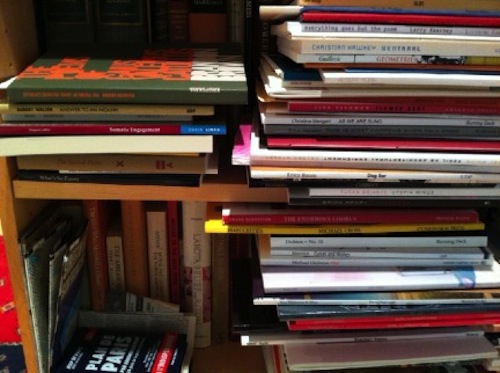for You

IF YOU WON’T LET US DREAM
WE WON’T LET YOU SLEEP
is what signs in Tahrir Square said in the days of the Arab Spring. In this case, we know who the YOU is. As Jane Sprague says, in her review [in XCP 12] of Ammiel Alcalay’s book, from the warring factions [Beyond Baroque 2002], we have “ideas of placing, of fixing – in time and space – where we are, who we are, and how it informs our complicated present.”
We seem to know who we are, but I had been thinking about the second person, the you, singular and/or plural, in poetry. I’d been talking with a student about his poems, and saw he wrote I, we, they and she, he, but never a you… so I spontaneously asked him to think about writing you. He looked perplexed, but then perhaps it was I looking a little perplexed. What was I asking him in this form of verbal gesture to do, to perform?
You has no borders.
Whoever says You does not have something; he has nothing. But he stands in relation.
(p.55, I and Thou, Martin Buber. Tr. Walter Kaufmann)
“It is poetry that transforms the real world into fiction.” [Barbara Guest, “Poetry the True Fiction,” Forces of Imagination.] After all, you is a construct. The poem constructs you as a formal device. Implicates you, metaphorically or literally. By means of apostrophe, which means a turning away—out of the frame. By invocation to the muse. By just saying “you.” By implication. By not saying you.
“Little book, you will go without me….” [Ovid, Tristia, Book I. Loeb Classical Library, 1924. Tr. Arthur Leslie Wheeler]
Muses, urns, wind, friend—you name it.

I decided to look at some recent books of poetry I had on my shelf, to see what was going on right now with you. I found that a great number poets you a lot, a few not at all. Here are some lines about you:
Listen to dreams. Where are you? Stay among us. Dear little sister, you seem a tiny wrecked thing to me. You were mortal once. You ask for a window. I wonder, do you? You put your body in the square, you cluster. I scarcely knew you existed. And you impossibly sleeping across the table from me. You could be anywhere north south. You tell me. Would you like a sip of coffee from this cup? For your listening pleasure. And there’s your mother. How come you love her too? Your voice is so charming. Listen Sweetheart. I like you. So too, your charms, your valences. You can’t hear me. Now you hold your breath as you turn. You bring the very structure of my thought. You or someone. Do you see what I’m saying? O tempora, o mores. You doting failures. Love, we have so much in common. You must accept. You were saying. You’ve earned an exciting new cell phone. O tiny phone. O radio, save me. Then it’s you again, you mouse. Do you need the shit I’m making? Press it against your cheek. Hold it to your cheek. Press it sweetly to your cheek. Don’t you want that? Just hedge your bets. Face this way. Grant me the splinters. In eye of you my love. In a lonely room you often ask the dead to visit you. Who is writing then? Who if I cried out…. You ask me if I have an idea for you. You can stretch your hands, wing man, and touch the leaning houses on opposite sides, flaring orange, mauve, and blue like an aviary…. But you are no pilot. You’ve got an orange in each pocket. Jane, Jane, go take a bath. Won’t you forgive me the way I’ve already forgiven myself? Babies, forgive me. You are smothering me. Keep your distance. Do it yourself. Get out of here. Please don’t do that again. Now get out of the house. Get on the bus. Where are your things? O my soul, what will you do? The bees are dying, my darling. You won’t feel a thing. You are a distant speck. The future you asked about is a square torn out of the center gold and orange money for the dead. The body of your goldfish. And nothing is left except light on your fur. Hail Mary. You come home soon. You’re lucky. Begin here. Stop the invocation. And if you don’t go crazy, I’ll meet you here tomorrow.
written by these poets: Stephen Collis, Brian Shimoda, David Lespiau (tr. Keith Waldrop), Hoa Nguyen, Stacy Doris, Sawako Nakayasu, Maxine Chernoff, Lindsey Boldt, Andrew Kenower, Tyrone Williams, John Sakkis, Michael Palmer, Amy King, Larry Kearney, Bhanu Kapil, Amanda Nadelberg, David Brazil, Emily McVarish, Divya Victor, Rob Halpern, Gunnar Bjorling (tr. Frederik Herzberg), Jennifer Martenson, Paul Vangelisti, Lauren Shufran, Bill Cassidy, Helen Dimos, Kyle Schlesinger, Joel Dailey, Nancy Kuhl, Camille Roy, Rebecca Wolff, Mary Jo Bang, Priscilla Becker, Susan Bernofsky, Dorothea Lasky, Macgregor Card & Megan Ewing, Sara Wintz, Jill Magi, George Kalamaras, Cole Swensen, Georg Trakl (tr. Daniel Simko), Christian Hawkey, Rainer Maria Rilke, Robert Walser (tr. Paul North), Aaron Shurin, Laura Moriarty, Brian Teare, Frank Kuenstler, Ben Fama, Natalie Lyalin, Kate Colby, Yvan Yauri, Susan Gevirtz, Leslie Scalapino, Wallace Stevens, Chris Tysh, Julie Carr, Michael Barron, Ayane Kawata (tr. Sawako Nakayasu), Julian Brolaski, John Wieners, Farid Matuk, Kate Pringle, Michael Cross, Filip Marinovich
And listen, Sparrow, before I forget, do read The Poems of Gaius Valerius Catullus by Brandon Brown [Krupskaya 2011]
Norma Cole is a poet, painter, and translator. She was born in Toronto, Canada, and attended the University...
Read Full Biography

